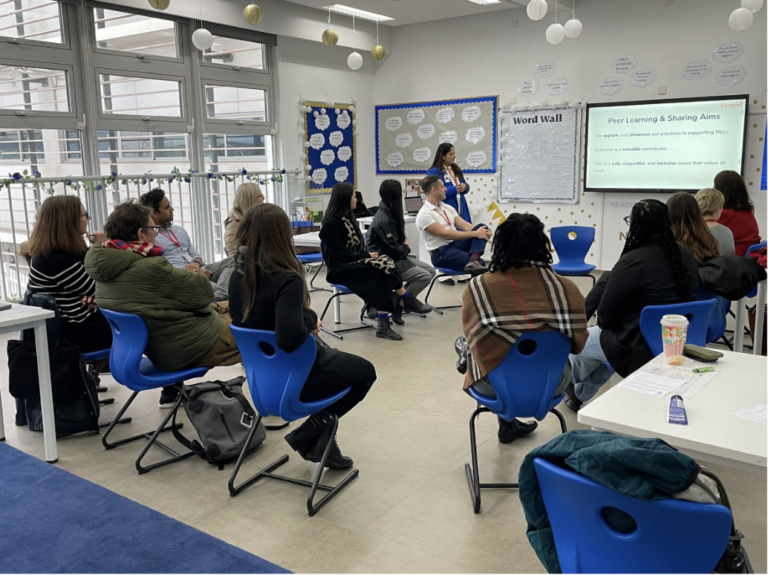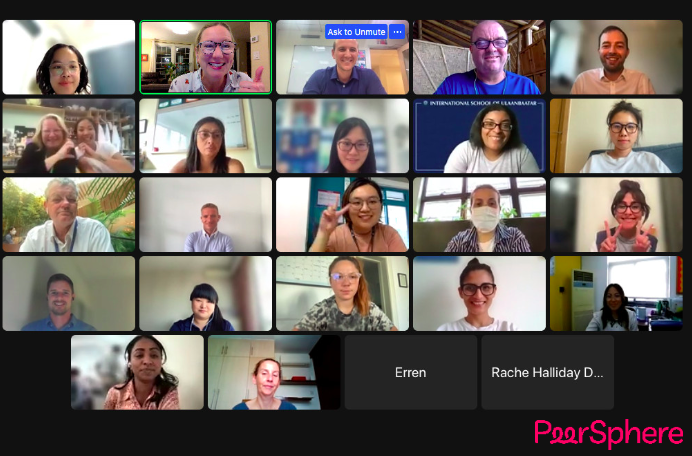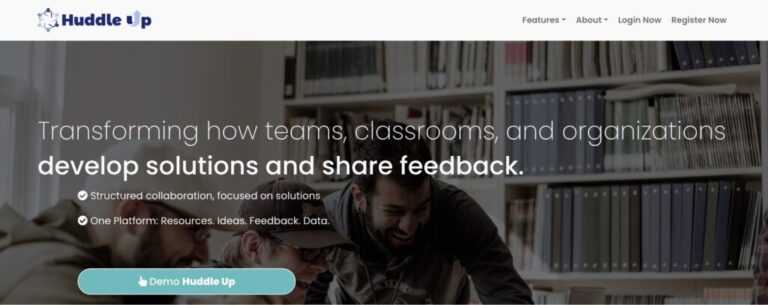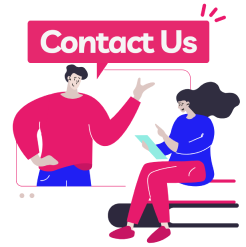By LeeAnne Lavender, PeerSphere storyteller
Professional development is a vital part of an educator’s life and journey. Growing, learning, and expanding one’s knowledge and expertise is a rich way of modeling what it means to be a lifelong learner, and of becoming an evermore impactful teacher or leader.
In 2024/25, we are lucky to have an array of excellent professional learning opportunities to choose from. Conferences (in-person and virtual), workshops, online webinars and courses, books and podcasts, coaching/mentoring, action research projects, communities of practice, and peer learning communities… there are so many ways to explore topics, issues, and skills to “develop expertise in the curriculum, instruction, and the assessment of student learning, finally resulting in improvements in students’ educational outcomes”. (Ma, Xin & Du, 2018) For busy teachers, connecting with the most effective, hands-on, and interactive options is essential so professional learning can be as impactful as possible.
For educators in Asia, the options for professional learning and development through peer learning have grown immensely over the last few years because of PeerSphere, an organization founded by Michael Iannini and Ewen Bailey that specializes in peer learning for educators and all staff at international schools.
“We started with eight communities and six facilitators two years ago, and we’ve grown to 63 communities and 115 co-hosts,” reflects Ewen. He credits this growth to the foundation of peer learning: connection. “Our communities are modeled on job-alikes or teach-meets where someone facilitates a group of people with similar jobs/roles. There’s often a focus on bread-and-butter things like assessment, curriculum, pedagogy, the how-tos of teaching specific things, hearing different perspectives, discussing constraints, fostering creativity with others who understand those constraints… It’s about connection through communities and purposeful learning experiences with professional hosts.”
Ewen has been passionate about peer learning for many years, through his own experiences as a classroom teacher and then as a director of professional learning. His hands-on exposure to peer learning aligns with research about why this is a powerful and impactful approach to professional development.
Research confirms what most teachers already know, that “one of the best ways to learn how to be a better teacher is by watching, listening to, and experimenting with the practices of great teachers.” (Porosoff, xii)
Anyone who has had the opportunity to observe a master teacher in action can attest to the learning, growth and inspiration that occurs when there’s a chance to watch, listen and reflect on the practices of such a colleague. There’s a magic that can occur where the observer comes away with tangible, relevant and immediately-applicable strategies they can transfer to their own classroom or setting.
This practical approach is at the heart of peer learning, whether that happens in a virtual peer learning community (PLC), a face-to-face workshop, an in-school community of practice, or a peer coaching relationship.
The rise of peer learning as a successful professional learning strategy for international educators has been amplified since the Covid-19 pandemic which precipitated an expanding selection of online professional learning options that offer teachers more choice and autonomy in shaping their PD experiences. As “teachers have very little patience for PD sessions that lack relevance to their students and subject,” (Porosoff, 2021, xii) it makes sense to move away from “‘sit-and-get’ workshops towards teacher-driven approaches that support reflection, inquiry and collaboration.” (Elkomy & Elkhaial, 2021)
The secret ingredient that really makes this work in peer learning environments is authentic connection, trust and openness. As teachers collaborate with other educators in similar roles,a safe and inclusive space emerges when everyone’s opinion and voice is valued equally. In a recent peer learning study in Egypt, participants articulated that “the main advantage of peer mentoring was the sense of equality and friendship.” (Elkomy & Elkhaial, 2021) As “resources and materials are exchanged openly” and “ideas are voiced confidently without being afraid of criticism or belittling… that’s how trust and respect have been nurtured.” (Elkomy & Elkhaial, 2021)
“… the main advantage of peer mentoring was the sense of equality and friendship.” (Elkomy & Elkhaial, 2021)
PeerSphere master educator and PLC host Henry Wong agrees that trust is foundational to the success of peer learning.
“Ideally, a peer learning community has to be interactive and open,” he says. “Everyone learns from each other because there is so much collective wisdom in the group. I always start by asking how many years of experience people have in their current position and when you multiply this across the group, it means hundreds of years of experience! As the host, I get to facilitate and guide conversations and experiences where that wisdom can be shared.”
In the context of this positive and supportive environment, peer learning and coaching can lead to focussed and relevant outcomes. Educators get to decide what issues or skills they want to explore and, as they do so, they build knowledge and deeper understanding together in a collaborative fashion. This personalized learning approach “help[s] to enrich the in-service teachers’ practical knowledge and teaching context” and “help[s] them build relationships between their practical knowledge and the specific teaching context.” (Ma, Xin & Du, 2018)
The result is highly applicable with immediate gains in knowledge, skills and pedagogical approaches to everyday teaching and learning. Add meaningful reflection into this mix and you can see why peer learning strategies offer teachers opportunities for deep engagement, networking and growth.
Dr. Shannon Doak, the Director of Technology at Nanjing International School (NIS) in China, is a PeerSphere PLC host whose doctorate (completed several years ago) focused on how international school teachers use social media for professional development; he knows that engaged online conversations via peer learning lead to improved learning and practice.
“The key is quality connections with others and with the ideas being explored,” says Dr. Doak, who says that the role of a host in a peer learning community maximizes impact.
“The literature and research are clear that a host is key for impactful learning in online communities,” he says. “You need a host to keep everyone involved, and that can lead to deep engagement and new understandings.”
Lauren Porosoff, author of How to Design Peer-To-Peer Professional Learning That Elevates Teachers and Teaching, agrees that the curation of professional learning topics and approaches is essential to the success of peer learning. She uses the metaphor of a museum or art gallery curator to explain the artfulness of a PD coordinator or PLC host. In the introduction to her book, she writes: “As a PD curator, you’re not just giving teachers an exciting menu of options to choose from— or even weeding out the boring and pointless ones. You’re caring for the professionals and for the profession.” (Porosoff, 2021, xv)
Porosoff suggests that a good PD curator can shape a community of practice, as well as its conversations and learning, in impactful ways.
“In our PLCs, we believe the role of our hosts is essential,” says PeerSphere co-founder Michael Iannini. “We recruit passionate and experienced professionals to host our communities, and then we support them with coaching and provide them a community to further their own professional growth.”
“In our PLCs, we believe the role of our hosts is essential,” says PeerSphere co-founder Michael Iannini.
In fact, in 2024-25, PeerSphere hosts will have the chance to work with facilitation coaches, seven educational consultants and leaders who will support hosts according to individual goals. They’ll even observe the hosts in action and provide feedback and mentorship. This supports the idea that everyone involved in professional development is a lifelong learner, and that we can all continue to grow and evolve throughout our careers.
This “paradigm shift of continuous professional development emphasizes the move towards more constructive, inquiry-based approaches such as networks, clusters and communities of practice where teachers are more motivated to work collaboratively in order to find solutions for their pedagogical problems at the school site.” (Elkomy & Elkhaial, 2021)
And peer learning isn’t just for classroom teachers, although educators are certainly at the core of PLC success. Anyone working at an international school, from lab technicians and librarians to operations and administrative staff can benefit from a peer learning experience. This is vital because the principles of peer learning for teachers are the same for all roles within an international school community; we all benefit from the knowledge and experience of peers in similar roles.
If you’re interested in learning more about the power of peer learning, check out some of the links below. You can learn more about the 63 peer learning communities offered by PeerSphere in 2024-25 by visiting their website or by contacting Michael or Ewen by email.
Sources:
Elkomy, M. M., & Elkhaial, N. H. (2021). The lesson study approach to professional development: Promoting teachers’ peer mentoring and communities of practice and students’ learning in Egypt. Teaching and Teacher Education, 109 (October 2021). https://doi.org/https://doi.org/10.1016/j.tate.2021.103538
Porosoff, L. (2021). “Introduction: A Case for Peer-to-Peer PD.” In The PD Curator : How to Design Peer-To-Peer Professional Learning That Elevates Teachers and Teaching. Association for Supervision & Curriculum Development, USA, 2021.
Ma, N., Xin, S., & Du, J. Y. (2018). “A Peer Coaching-based Professional Development Approach to Improving the Learning Participation and Learning Design Skills of In-Service Teachers.” Educational Technology & Society, 21 (2), 2018.
Further reading:
- How Peer Learning Communities create Dynamic Professional Development
- How Peer Learning might have more Impact than Attending Conferences
- The Buzz about Peer Learning
- Maximizing Your Peer Learning Community Experience: Top 10 Strategies for Educators
- How Research Shows Peer Learning is Effective Teacher PD
- Harnessing the Power of Online Communities for Transformative Teacher Professional Development












